Medically review by Kim Langdon
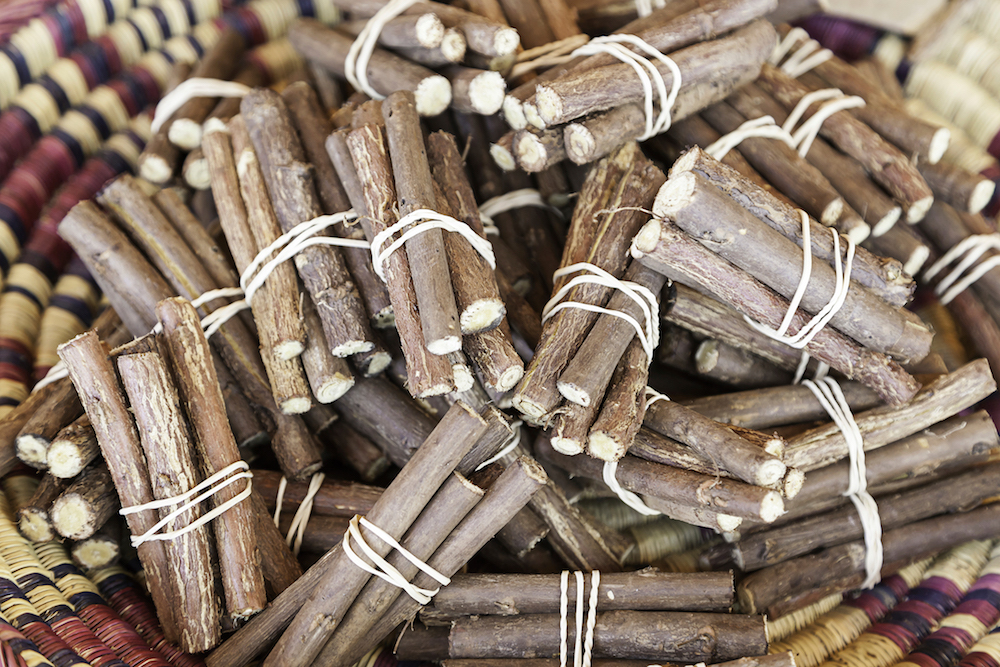
How familiar are you with licorice?
You might know it in its deliciously sweet candy form, or you may have an aversion to it if you know the distinct taste and color of black licorice.
Today, we're talking about neither. We're taking all the sugar-coating off - literally - and getting down to business on licorice's absolutely incredible medicinal benefits.
Licorice is a perennial herb, and its uses are no surprise. It's been used medicinally for centuries already, and it's popular in Ayurvedic medicine and healing.
Its scientific name is glycyrrhiza which translates to "sweet root," reaffirming its common associations.
These wood-like sticks can indeed be a little sweet, but the benefits are sweeter.
Traditional uses of licorice root
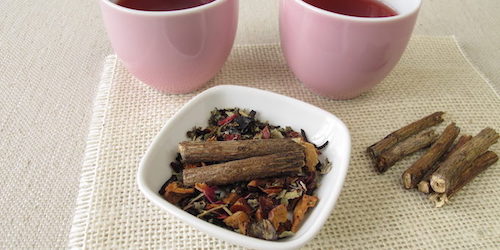
In Ayurveda, it's considered an expectorant like cough medicine, an anti-inflammatory agent, spasm-relieving and positively impactful on the adrenal glands for healthy, optimal hormone functioning.
In Arabia, licorice has been used to relieve coughing. In Greece, they also used the root for asthma treatment.
In China, they found it helpful to clear up the mucous membranes and gastrointestinal spasms.
These days, it's most notoriously recognized for its soothing effects on the respiratory and digestive system.
Do the pros in herbal medicine have you convinced yet?
Licorice root is an adaptogenic herb, meaning that it can help your body to handle more.
Not only is it an effective treatment for many ailments, but it helps the body become resistant to those same things.
One of its other most notable abilities is its impact on other herbs.
Taken with other supplements, licorice root helps their positive effects become even more powerful!
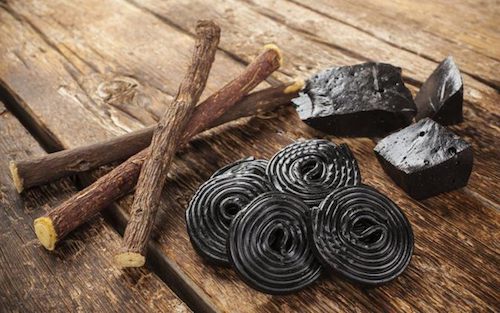
Expectorant uses. It's a common remedy for a sore throat, cough, cold and other upper respiratory issues.
It can help to loosen phlegm. It's also been used effectively for bronchitis. Instead of using standard lozenges or cough drops - many with added color and sugar - use licorice for cold relief instead.
Digestive support. If you ask us for our understanding of good health, we'll tell you to look at digestion.
Optimal digestion can be tough to achieve with how many problems we run into, but licorice can offer relief for bloating, gas and intestinal inflammation. It's also helpful for acid reflux relief.
Antibacterial properties. These properties can be beneficial to relieving stomach ulcers and other bacterial infections.
Regular use can also inhibit bacteria growth, making a good preventative treatment if you are susceptible to bacterial infections (1).
Incredible anti-inflammatory agent. Like the much-beloved turmeric, licorice root is an anti-inflammatory hero (2) which means it's effective in treating ulcers and can be effective in treating pain or healing from injury.
Moreover, this backs up its case in the ability to treat cough or digestive distress.
Natural and safe laxative use. It's normalizing effects on digestion are the star of the show, but licorice can even be helpful for those who suffer from chronic constipation.
Adrenal support. This is one of the best natural supplements you can take to support adrenal health or heal from adrenal fatigue (you can see our other recommendations here).
It helps the body regulate cortisol. When we produce too much, we go into our default "fight or flight" response and the adrenals are under a lot of stress. Chronic stress will inevitably lead to fatigue.
Immune-boosting properties. Licorice root can promote T cell production. These are the cells we want for a healthy immune system, and their induction helps to control an immune response.
It can also prevent autoimmunity.
Women's health. Licorice root can ease symptoms of PMS and menopause alike. Say goodbye to cramps and hot flashes.
How much is too much?
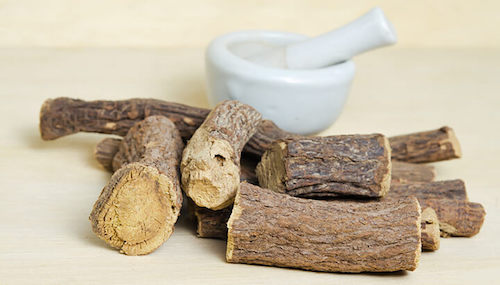
You don't want to overdo it!
While natural, herbal remedies are generally very safe and can be used without side effects - especially adaptogens - it's always good to discuss precautions you might want to take.
If licorice root is used in excess, beyond the safe recommendations below, it can lead to pseudoaldosteronism.
Basically, this makes you overly sensitive to a hormone found in the adrenal complex, negating any adrenal hormone benefits you might experience!
Moreover, women who are pregnant or breastfeeding should avoid the use or at least discuss with a doctor ahead of time. Mild "overdose" in anyone can cause fatigue, high blood pressure, and headache.
In the worst cases, licorice root can cause a heart attack.
With any supplement addition to your diet, it's good to bring it up with your doc, especially if you have pre-existing medical conditions.
How to use licorice root
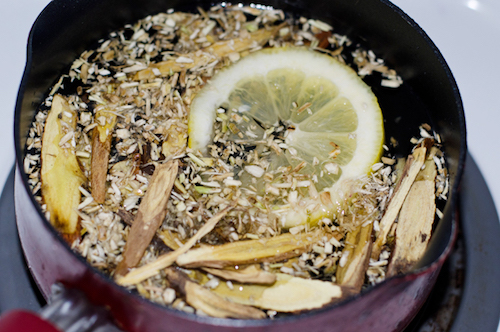
There are a variety of ways to supplement or use licorice. Learn more about dosage, our recommended products and how many times per day you can safely use your chosen method of intake.
One of my favorite store-bought items with licorice is Yogi tea.
You can purchase all these items with the links below, but if you're looking for licorice root in your community, it's good to check out the bulk section at your local health foods store or co-op.
- Dried root. You can simply purchase some to chew on casually or use dried licorice root to make infusions or teas. Simply boil 1-5 grams into a brew up to three times per day. This will taste wonderful, and you can mix it with other herbs to fully customize your "medicine." After all, it's important to remember that the root enhances the potency of other herbs!
- Make a tincture. If you purchase licorice root in its liquid form, you can use 2-5 ml of the tincture about three times per day as a supplement, or as needed.
- Licorice root powder. You can blend the powder of the root into smoothies or use it as you would any other "superfood" powder. Its naturally sweet taste will be much welcomed into many foods, deepening the flavor and the healthy benefits of your meals!
- Licorice root extract. You can simply supplement with capsules at 250-500 mg around three times per day. You can purchase them already made, or make your own with powder and natural capsules.
- Use as a mouthwash. Considering its antibacterial properties, it can be really good for cleaning the mouth! This is especially true if you have canker sores or mouth wounds that need healing. Simply mix 1/2 tsp. of powder with 1/4 cup of water, and use 2-4 times per day until you feel relief.
Have you ever used licorice root? Whether or not you're a fan of the candy, you may very well be a fan of the root itself!
We hope you learn more about its medicinal purposes here today. If you found this article helpful, share it!
This article was fact checked for accuracy by Dr. Kim Langdon, MD. As always, this is not personal medical advice and we recommend that you talk with your doctor.
The antiviral and antimicrobial activities of licorice, a widely-used Chinese herb from http://www.sciencedirect.com/science/article/pii/S2211383515000799
2. Licorice: A possible anti-inflammatory and anti-ulcer drug from https://www.ncbi.nlm.nih.gov/pmc/articles/PMC2750414/
Kimberly Langdon M.D. is a retired University-trained obstetrician/gynecologist with 19-years of clinical experience. She delivered over 2000 babies to mothers in a suburban Midwestern community.

